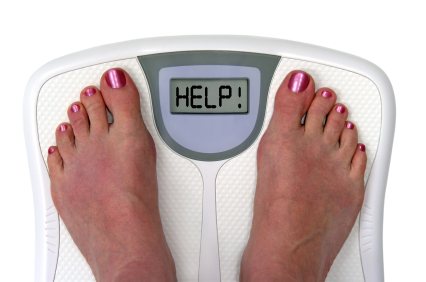Losing those first few pounds might not be so hard, but too many people quickly find that their weight loss slows or stops, even as they continue to do the very things that helped them lose initially. What’s going on? Chances are their metabolism has slowed down.
Dieting is one of the big reasons people’s metabolisms slows. Extreme dieting is well-known for this, but recent research also shows that even modest weight loss (5-10 % of body weight over the course of a year) can slow metabolism. That makes it harder to continue to lose weight, and sets you up to regain lost weight. It is one of the big, overlooked reasons people fail on diets, but it doesn’t have to be.
One good way to tell if your metabolism has slowed down is to check your body temperature. (For detailed instructions for how to take body temperature correctly, see “How are body temperatures measured?” on my website.) If it is consistently low– below 98.5 F., or 36.94 C, but typically lower than 97.8 F, or 36.56 C.–you can be pretty sure your metabolism has slowed down. That slows everything down in your body, including energy production and your ability to burn calories. Dieting becomes an uphill battle.
Exercising may help to boost your metabolism for a few hours, and is an important component of healthy weight loss. But when you have a slow metabolism, you may notice your motivation to exercise declines; you just do not have the energy! And that’s why proper thyroid health is so important. Slow metabolism and low body temperature are often a result of low thyroid hormone function. This can be the case even when you have normal Thyroid Stimulating Hormone (TSH) blood levels. In fact, research suggests that moderate dieting depresses T4 to T3 conversion in peripheral tissues. That means you can have normal TSH levels but you are not getting active thyroid hormone, T3, where you need it.
You may help restore normal metabolism by taking supplemental T3, the active form of thyroid hormone and a prescription drug. Your body temperature may return to normal and you may find yourself once more able to lose weight. You may have more energy–even enough left over to exercise. I’ve found that many people are successful with weight loss once their body temperature is corrected.
Your doctor can call us at 800.420.5801 to get more information about how to use T3, along with nutritional and herbal support for thyroid problems, and to discuss your individual case. You can also use our website to find the health care practitioner closest to you who is trained in T3 treatment.
REFERENCES
Abdalla SM, Bianco AC. Defending plasma T3 is a biological priority. Clin Endocrinol (Oxf). 2014 Nov;81(5):633-41.
Agnihothri RV, Courville AB, Linderman JD, et al. Moderate weight loss is sufficient to affect thyroid hormone homeostasis and inhibit its peripheral conversion. Thyroid. 2013 Jul 31.
Weiss EP, Villareal DT, Racette SB, et al. Caloric restriction but not exercise-induced reductions in fat mass decrease plasma triiodothyronine concentrations: a randomized controlled trial. Rejuvenation Res. 2008 Jun;11(3):605-9.


Leave A Comment